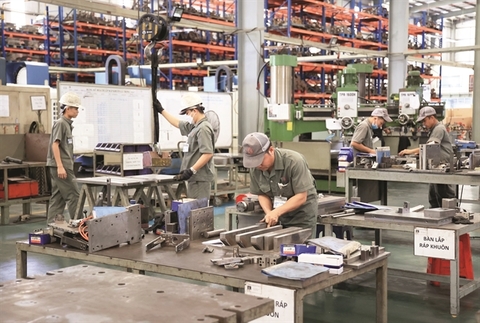
Workers of Động Lực Casting Corporation in the southern province of Đồng Nai's Trảng Bom District. 31 per cent of EU firms ranked Việt Nam among their top three FDI destinations. — VNA/VNS Photo Hồng Đạt
Việt Nam's global investment appeal remains strong. A notable 63 per cent of surveyed businesses positioned Việt Nam within their top 10 FDI destinations.
This information was released in the European Chamber of Commerce Việt Nam's (EuroCham) quarterly Business Confidence Index (BCI) on Monday.
Even more striking, 31 per cent ranked Việt Nam among their top three, while an impressive 16 per cent hailed it as their foremost investment destination. Reflecting this confidence, over half of those surveyed plan to increase their foreign direct investment in Việt Nam by the end of the year.
The report showed that the BCI has regained its upward trajectory in the third quarter of the year, offering a glimmer of hope for the Vietnamese business environment after a turbulent year.
The BCI nudged up to 45.1 in Q3 2023, from 43.5 the previous quarter. While still below the 50-point threshold for four straight quarters, this small rise indicates emerging positive economic momentum.
Business sentiment appears to be in flux. Between Q2 and Q3, there was a three percentage point drop in pessimism regarding the current situation, while positive and neutral perspectives increased by six and four percentage points, respectively.
Furthermore, the Q3 survey revealed a shift in projections for the quarter to come. Compared to responses in the Q2 survey, there was an 11 percentage point rise in businesses anticipating economic stabilisation and growth for the upcoming quarter. On the other hand, businesses projecting a negative trend reduced by five percentage points.
Approaching year-end, hope and caution persist. Though Việt Nam's Q3 GDP grew a promising 5.3 per cent year-on-year, companies continue to be cautious. Expectations regarding increased revenue or orders remained stable, with no change from the previous quarter. Just 22 per cent of companies plan to expand their teams in Q4. Only 16 per cent expect an increase in investments.
Yet hurdles persist. A substantial 59 per cent cited administrative difficulties as their main challenge when operating in Việt Nam. Challenges such as uncertainties in rules and regulations, hurdles in permit acquisition, and strict visa and work permit requirements for foreign workers also stood out as prominent barriers.
To improve the nation's FDI attraction, 58 per cent of respondents said streamlining bureaucracy is key, 48 per cent advocated for enhancing the regulatory environment, one-third called for upgrading transport infrastructure, and 22 per cent emphasised easing visa and work permit requirements for foreign experts.
Sustainability is rising as a priority for European companies in Việt Nam, with 80 per cent citing ESG alignment as highly or moderately important.
However, major obstacles remain when translating priorities into practice. Regulatory uncertainty, infrastructure gaps, and insufficient government support were cited as hindrances to implementing sustainability measures locally.
Additionally, only 20 per cent of firms are proactively preparing for impending EU green regulations, such as the Carbon Border Adjustment Mechanism. Meanwhile, 38 per cent currently have no plans for alignment. This distinct lack of preparedness not only poses challenges domestically but can hinder international competitiveness, especially in the crucial EU market.
The BCI, which is conducted by Decision Lab, has provided a periodic pulse check on Việt Nam's economy since 2011. — VNS